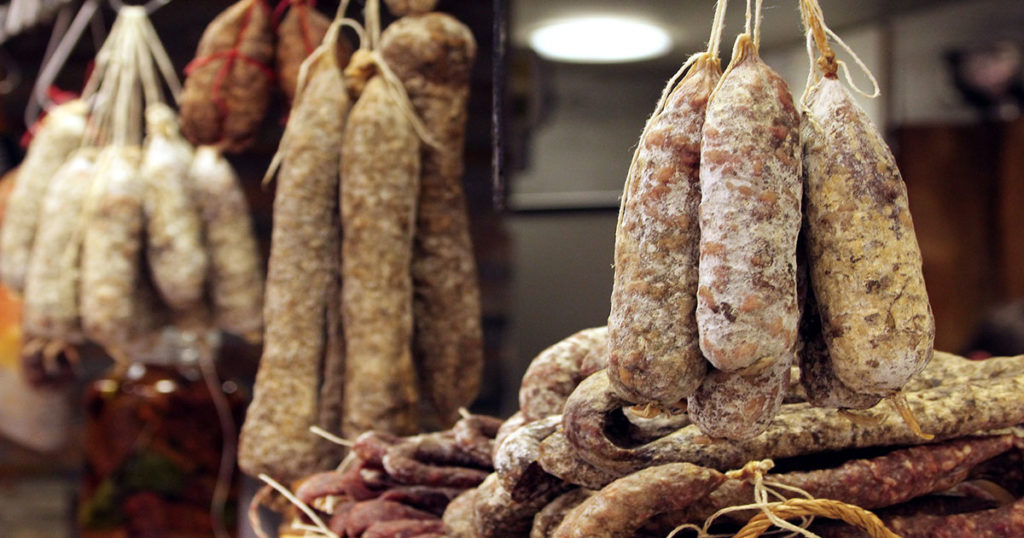
The table was mostly cleared, and we had ordered dessert. Three flans, two coffees, and a strawberry ice cream cone for the six of us—my mother and me, my friend, his daughter, her husband, and their daughter, a child of four. It was about five p.m. Activity in the restaurant had slowed, and most diners were finishing up, though a few had recently ordered and were still waiting for their food. The weekend lunch hour in Spain is long, and you can expect to be shown a table at a restaurant if you arrive anywhere from two o’clock until as late as four or even after. If there is a table, that is.
The waiter seemed a bit dazed from the rush that was now tapering off. He brought the order not all together on a tray but piecemeal, one item at a time as he went past our table to attend to customers at the outside tables. When he set a flan in front of my friend, my friend passed it on to me. I passed it to my mother, who asked, “What about you?” I answered that mine would arrive soon. But the waiter did not bring mine, nor the one for my friend. My mother finished her dessert, my friend’s daughter and her husband drank their coffees, and the little girl ate half of her strawberry ice cream cone. In Spain, you do not wait for the waiter to see you’re ready and bring the bill, but instead ask for it or get up to pay at the register, as my friend got up to do. I no longer believed that the waiter would appear with my dessert. He had heard the order, I was sure, so he must have just forgotten. Out on the street, my friend’s daughter checked the bill to make sure we hadn’t been charged for the dessert we hadn’t gotten. We had not. My friend said who cared about that—we had ordered the dessert and should have been served. But he was not the kind of person to settle the matter by reminding the waiter of his error.
Once, when my friend and I were overcharged in a restaurant, I had wanted to point out the error. Not he. “Do you think they don’t know?” he’d asked me, and in truth it never occurred to me they might be deliberately overcharging us, meaning that the error in the bill was in fact an act of cheating. But my friend was sure they did know. He would rather be overcharged than give them the satisfaction of feigning dismay, as if we were bobo enough to believe it. Tonto is another word with the same meaning—gullible, foolish. He didn’t want to play that game. His solution was simply to never go back. That was his last word.
But it wasn’t always. Moscancia is a type of sausage typical in Asturias that is eaten in a stew with garbanzos and flavored with a ham bone, and one day many years ago at the local market on a Tuesday, my friend stopped at a stand where these sausages were dangling behind the counter, next to other goods. When he ordered the sausage, however, the merchant told him he sold the sausage with the ham bone, not separately. He didn’t want the bone, my friend explained, just the sausage, but the merchant wouldn’t oblige. “All right,” my friend said, and left.
He didn’t leave the market though but circled through it until he found the policeman patrolling the market, as there typically is on market day. He pointed out the stand and explained the situation. Why he didn’t want the bone was no one’s business, so I was not surprised that my friend invented a reason. “My dog,” he told the policeman, “eats only moscancia.”
“Follow me,” said the officer, and off they went to the stand, where the merchant said he’d be glad to sell the sausage with the bone, whereupon the officer, quoting from the civil code, informed the merchant that he was obliged to sell as much as was wanted of any items on display to a customer who waited his turn and had money to pay. He could not refuse. If an item was sold only with another item, the two had to be packaged together.
“What happened?” I asked.
“I bought the sausage,” my friend said.
“Why didn’t you just leave? Not give the man your business?”
He smiled. “The sausage was for my mother. Do you think I could go home to my mother empty-handed?” he asked. “What do you think I am, bobo?”

